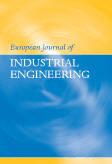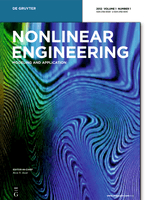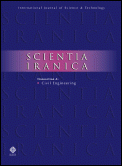
International Journal of Mathematical Engineering and Management Sciences
Scope & Guideline
Transforming Ideas into Impactful Solutions Across Disciplines.
Introduction
Aims and Scopes
- Mathematical Modeling and Analysis:
The journal emphasizes the development and application of mathematical models to analyze complex systems and phenomena across various fields. - Optimization Techniques:
A core area of focus is the implementation of optimization methods to improve processes, resource allocation, and decision-making in engineering and management. - Interdisciplinary Research:
The journal encourages interdisciplinary approaches that combine mathematics, engineering, information technology, and management sciences to address contemporary challenges. - Sustainable Development:
Research that explores sustainable practices and technologies, particularly in supply chain management, energy systems, and environmental engineering, is prominently featured. - Artificial Intelligence and Machine Learning Applications:
The integration of AI and machine learning techniques in engineering and management problems is a significant theme, reflecting the journal's commitment to modern technological advancements.
Trending and Emerging
- Blockchain Technology in Supply Chain Management:
There is an increasing focus on the integration of blockchain technology within supply chains, showcasing its potential to enhance transparency, security, and efficiency. - Artificial Intelligence and Data Analytics:
The application of AI and data analytics is trending, particularly in areas such as predictive modeling, risk assessment, and decision support systems. - Sustainable Practices and Circular Economy:
Research emphasizing sustainability and circular economy principles is gaining attention, particularly in sectors like agriculture and manufacturing. - Smart Technologies and IoT:
The rise of smart technologies and IoT applications in various domains, including healthcare and supply chains, is becoming a significant theme in recent publications. - Robustness and Resilience in Systems Engineering:
Emerging studies are increasingly focusing on the robustness and resilience of systems, especially in the context of risk management and disaster recovery.
Declining or Waning
- Traditional Statistical Methods:
There has been a noticeable decrease in the publication of papers relying solely on traditional statistical techniques, as more innovative and computational methods gain traction. - Purely Theoretical Research:
Research that does not apply mathematical theory to practical, real-world problems is becoming less frequent, indicating a shift towards more applied research. - Single-Domain Studies:
Papers that focus exclusively on narrow, single-domain issues without interdisciplinary collaboration are waning in favor of more comprehensive, cross-disciplinary studies.
Similar Journals

INFORMS Journal on Applied Analytics
Driving Excellence through Rigorous ResearchINFORMS Journal on Applied Analytics, published by the esteemed Institute for Operations Research and the Management Sciences (INFORMS), is a leading journal dedicated to advancing the field of applied analytics. With an ISSN of 2644-0865 and an E-ISSN of 2644-0873, this journal aims to provide a platform for innovative research that transforms data into actionable insights, fostering the integration of analytic methods into practical applications across diverse industries. The journal's rigorous peer-review process underpins its commitment to high-quality research, ensuring relevance and impact in the rapidly evolving domain of analytics. While it currently operates under a subscription model, the journal facilitates the dissemination of knowledge to a wide audience of researchers, professionals, and students who are eager to explore the intersection of analytics and decision-making. As organizations increasingly turn to data-driven solutions, the INFORMS Journal on Applied Analytics serves as an invaluable resource for those looking to enhance their understanding and application of advanced analytical techniques.

JAPAN JOURNAL OF INDUSTRIAL AND APPLIED MATHEMATICS
Driving Progress through Cutting-Edge Mathematical ResearchThe Japan Journal of Industrial and Applied Mathematics, published by Springer Japan KK, is a pivotal platform for disseminating cutting-edge research in the fields of applied mathematics and engineering. With an ISSN of 0916-7005 and an E-ISSN of 1868-937X, this journal has been a cornerstone in the academic community since its inception in 1991 and will continue to contribute pivotal insights through 2024. Positioned in the Q3 category for both Applied Mathematics and Miscellaneous Engineering according to 2023 rankings, it is recognized for its diverse range of topics and interdisciplinary approaches. Despite its competitive ranking, the journal fosters valuable contributions that challenge conventional methodologies and inspire innovation. Researchers, professionals, and students alike will find the journal’s contents invaluable for advancing knowledge and exploring new methodologies in industrial and applied mathematics.

Opsearch
Connecting Researchers to Drive Scientific EvolutionOpsearch is a distinguished journal published by Springer India that serves as a vital platform for researchers, professionals, and students in the dynamic fields of Computer Science Applications, Information Systems, Management Information Systems, and Management Science and Operations Research. Since its inception in 2009, it has been dedicated to disseminating innovative research findings and practical applications that contribute meaningfully to the evolution of these disciplines. With its notable positioning in the Q2 and Q3 quartiles in various categories, Opsearch boasts a robust reputation with Scopus rankings placing it competitively within the fields it represents. While currently not an Open Access publication, the journal is committed to ensuring that the research it publishes is accessible to an extensive audience through libraries and institutional subscriptions. The journal's overarching objective is to foster knowledge exchange and interdisciplinary collaboration, making it an indispensable resource for advancing theoretical and operational research.

European Journal of Industrial Engineering
Exploring the Frontiers of Manufacturing ExcellenceEuropean Journal of Industrial Engineering, published by INDERSCIENCE ENTERPRISES LTD, stands as a significant platform within the field of industrial and manufacturing engineering, with a commendable impact factor reflecting its academic rigor and relevance. The journal, recognized in the 2023 Q2 category, encourages innovative research and practical applications that are critical to advancing the discipline, drawing insights from global scholars and practitioners. As of 2023, it ranks #183 out of 384 within its Scopus category, placing it within the 52nd percentile, a testament to its emerging influence in the scholarly community. Although currently not Open Access, the journal spans a dedicated timeframe from 2007 to 2024, with an expansive scope that encompasses various facets of industrial engineering, including optimization, production systems, and supply chain management. Positioned in the United Kingdom, the journal not only aims to foster knowledge sharing but also to bridge the gap between theoretical advancements and real-world applications, making it a valuable resource for researchers, professionals, and students alike.

Nonlinear Engineering - Modeling and Application
Fostering Collaboration for Engineering ExcellenceNonlinear Engineering - Modeling and Application is a premier journal dedicated to advancing the fields of engineering, modeling, and simulation, published by De Gruyter Poland Sp. z o.o. since 2012. With an impressive impact factor reflected in its prestigious rankings—Q2 in Chemical Engineering and Miscellaneous Engineering and Q3 in Computer Networks and Communications—this journal serves as an invaluable resource for researchers and practitioners seeking to explore the intricacies of nonlinear systems and their applications. As an Open Access journal since 2019, it ensures that groundbreaking research is readily available to the global community, fostering collaboration and innovation. Situated at the forefront of its field, Nonlinear Engineering provides high-quality, peer-reviewed articles that contribute to understanding complex phenomena in various engineering disciplines, making it an essential publication for those eager to stay on the cutting edge of technology and research.

Scientia Iranica
Fostering collaboration to elevate global research standards.Scientia Iranica is a multidisciplinary journal published by SHARIF UNIVERSITY OF TECHNOLOGY, serving as a vital platform for researchers and professionals in the fields of Chemistry, Civil and Structural Engineering, Computer Science, Engineering, Industrial and Manufacturing Engineering, Materials Science, Mechanical Engineering, and Physics and Astronomy. Established in 1999 and converging until 2024, the journal has swiftly ascended in the academic realm, achieving a commendable status with several Q3 classifications across a variety of disciplines and a Q2 in Engineering (miscellaneous) in its 2023 quartile rankings. With its notable Scopus Ranks reflecting a consistent percentile presence in several categories, Scientia Iranica emphasizes rigorous peer-reviewed research and cutting-edge findings, thereby contributing substantially to the advancement of knowledge in its areas of focus. Although not available as open access, the journal remains essential, offering critical insights and fostering collaboration among scholars in Iran and globally, thus enhancing the visibility and impact of innovative research outcomes.

Gazi University Journal of Science
Fostering research excellence across diverse fields of study.Gazi University Journal of Science, published by GAZI UNIV in Turkey, stands as a pivotal platform for scholarly communication in the fields of engineering and multidisciplinary research. With an ISSN of 2147-1762, this journal has been a significant contributor to the academic landscape since its establishment, converging insights from diverse scholarly traditions and fostering interdisciplinary innovation from 2009 to 2024. Holding a respectable Q3 ranking in both Engineering (miscellaneous) and Multidisciplinary categories for 2023, it signifies an increasing influence in the scientific community, evidenced by its Scopus ranks, including a notable position of 65th out of 171 in Multidisciplinary and 190th out of 307 in General Engineering. The journal's commitment to advancing knowledge, promoting research excellence, and supporting the academic community makes it an essential resource for researchers, professionals, and students eager to stay at the forefront of science and engineering developments.

Journal of Mathematics Mechanics and Computer Science
Exploring new frontiers in mathematical theory and computational methods.Journal of Mathematics Mechanics and Computer Science is a pioneering open access journal published by AL-FARABI KAZAKH NATL UNIV, dedicated to advancing the field of mathematics and its applications in mechanics and computer science. Established in 2009, this journal aims to provide a platform for innovative research, encouraging the dissemination of high-quality, peer-reviewed articles that push the boundaries of mathematical theory and computational methods. Though the journal currently ranks within the lower quartiles in Scopus categories, it remains committed to fostering academic discourse and advancing knowledge in its scope areas. Located in Almaty, Kazakhstan, the journal also emphasizes accessibility, ensuring that all research is readily available to researchers, professionals, and students worldwide. With a focus on developing new theoretical frameworks and practical applications, the Journal of Mathematics Mechanics and Computer Science is an essential resource for those aiming to engage with cutting-edge developments in mathematics and computer science.

Elektrotehniski Vestnik
Illuminating the Path of Electrical Engineering ResearchElektrotehniski Vestnik is a respected journal in the field of Electrical and Electronic Engineering, published by the ELECTROTECHNICAL SOCIETY OF SLOVENIA . With a history dating back to 1969, this journal serves as a platform for disseminating innovative research, technical advances, and practical applications within the electrical engineering domain. Although currently classified in the Q4 quartile according to the 2023 ranking, the journal’s commitment to fostering knowledge within Slovenia and the wider scientific community remains unwavering. The absence of an open access option highlights the journal's traditional publishing model, aimed at ensuring quality and integrity in the peer review process. Researchers, academics, and students interested in exploring emerging trends and foundational topics will find Elektrotehniski Vestnik to be an indispensable resource for both immediate insights and long-term reference in their work and studies.

Decision Science Letters
Pioneering open-access research in decision sciences.Decision Science Letters is a premier open-access journal published by GROWING SCIENCE, dedicated to advancing the field of decision sciences since its inception in 2012. With its ISSN of 1929-5804 and E-ISSN of 1929-5812, this journal serves as a vital platform for disseminating innovative research and practical applications of decision-making models and methodologies. Housed in Canada, the journal plays an essential role in bridging academic insights with real-world practices, appealing to a diverse audience of researchers, professionals, and students alike. Currently ranked in the Q3 category of Decision Sciences (miscellaneous) as per the latest evaluation, it has demonstrated an active contribution to the academic community, facilitating the exchange of knowledge over the years. Decision Science Letters emphasizes the accessibility of research, supporting the open-access model to enhance the global reach of scholarly work in the decision sciences arena. With the journal converging towards its next milestone in 2024, it continues to encourage submissions that push the boundaries of theoretical and applied research in this dynamic field.